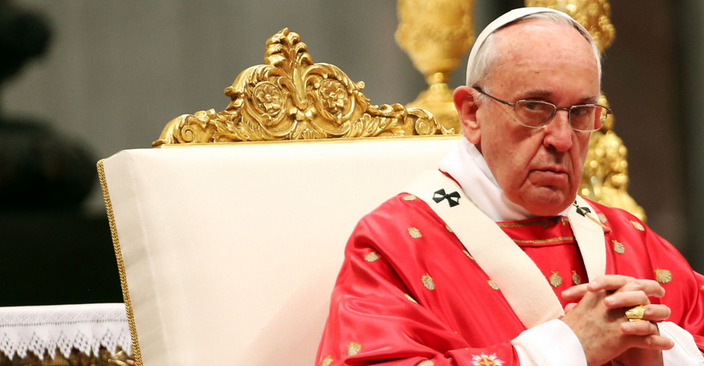In his latest encyclical, “Fratelli Tutti,” Pope Francis has contradicted centuries of Catholic teaching by trying to reconcile socialism with the Catholic faith.
Pope Francis is basically saying that the modern world has problems:
170. I would once more observe that “the financial crisis of 2007-08 provided an opportunity to develop a new economy, more attentive to ethical principles, and new ways of regulating speculative financial practices and virtual wealth. But the response to the crisis did not include rethinking the outdated criteria which continue to rule the world”.[147] Indeed, it appears that the actual strategies developed worldwide in the wake of the crisis fostered greater individualism, less integration and increased freedom for the truly powerful, who always find a way to escape unscathed.
And that, despite reducing abject poverty and hunger for billions of people, the free-market cannot fix the modern problem of inequality:
168. The marketplace, by itself, cannot resolve every problem, however much we are asked to believe this dogma of neoliberal faith. Whatever the challenge, this impoverished and repetitive school of thought always offers the same recipes. Neoliberalism simply reproduces itself by resorting to the magic theories of “spillover” or “trickle” – without using the name – as the only solution to societal problems. There is little appreciation of the fact that the alleged “spillover” does not resolve the inequality that gives rise to new forms of violence threatening the fabric of society.
Instead, we need to force people to love each other (through a “political love”):
182. This political charity is born of a social awareness that transcends every individualistic mindset: “‘Social charity makes us love the common good’, it makes us effectively seek the good of all people, considered not only as individuals or private persons, but also in the social dimension that unites them”.[171] Each of us is fully a person when we are part of a people; at the same time, there are no peoples without respect for the individuality of each person. “People” and “person” are correlative terms. Nonetheless, there are attempts nowadays to reduce persons to isolated individuals easily manipulated by powers pursuing spurious interests. Good politics will seek ways of building communities at every level of social life, in order to recalibrate and reorient globalization and thus avoid its disruptive effects.
He also reincarnates the motto of the French Revolution:
103. Fraternity is born not only of a climate of respect for individual liberties, or even of a certain administratively guaranteed equality. Fraternity necessarily calls for something greater, which in turn enhances freedom and equality. What happens when fraternity is not consciously cultivated, when there is a lack of political will to promote it through education in fraternity, through dialogue and through the recognition of the values of reciprocity and mutual enrichment? Liberty becomes nothing more than a condition for living as we will, completely free to choose to whom or what we will belong, or simply to possess or exploit. This shallow understanding has little to do with the richness of a liberty directed above all to love.
And repeats the JPII’s contradiction of Pope Leo XIII in “reenvisioning the social role of property:
I would observe that “the Christian tradition has never recognized the right to private property as absolute or inviolable, and has stressed the social purpose of all forms of private property”.
Of course, Christian tradition did. In Rerum Novarum, Pope Leo XIII, “it is clear that the main tenet of socialism, community of goods, must be utterly rejected, since it only injures those whom it would seem meant to benefit, is directly contrary to the natural rights of mankind, and would introduce confusion and disorder into the commonweal. The first and most fundamental principle, therefore, if one would undertake to alleviate the condition of the masses, must be the inviolability of private property.”
And Pope St. John XXIII said, “Private ownership of property, including that of productive goods, is a natural right which the State cannot suppress.”
Pope Francis ignores Leo XIII and his successors regarding the state’s legitimate role in society as Pope John XXIII, quoting Pope Pius XI, taught in 1961: “”No Catholic could subscribe even to moderate Socialism.” In 1931, Pope Pius XI denounced the exaltation of the state as “Idolatry.” He insisted that “Religious socialism, Christian socialism, are contradictory terms; no one can be at the same time a good Catholic and a true socialist.” And Pope St. John Paul II maintained that “the fundamental error of Socialism is anthropological . . . [because it] considers the individual person simply as an element, a molecule within the social organism… .”
Of course, Pope Francis is careful not to call it socialism. Instead he calls this idolotry of a benevolent one-world government the creepy and dystopian-sounding “political love”. I can just imagine bureaucrats going door to door saying, “I’m from the government, I’m here to love you.” No thanks.
Never before has a pope endorsed the failed politics and economics of state socialism in such a brazen manner. It appears he sees a universal, globalist government doing the Church’s work of charity through this political love. With this vision he contradicts not only Pope Leo XIII, Pope St. John XXIII and Pope St. John Paul II, but Church fathers like Augustine and even Jesus Christ Himself who expressly differentiated Caesar’s Earthly city and the City of God.
All Holy people pray for us and God have mercy on us!
 The Libertarian Catholic
The Libertarian Catholic
















